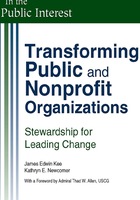
SUGGESTED READINGS ON THE CHANGE IMPERATIVE
Donald F. Kettl, The Next Government of the United States: Challenges for Performance in the 21st Century. Washington, DC: Transformation of Organizations Series, IBM Center for the Business of Government, 2005.
Kettl provides clear guidance on how leaders should both predict and prepare for change in order to succeed. Discussing how management challenges have changed in government, he highlights why recent events—such as 9/11 and Katrina—demonstrate that the government needs to change its approach to be able to respond to serious problems effectively.
Thomas L. Friedman, The World is Flat: A Brief History of the Twenty-first Century. New York: Picador, 2006 (updated edition), 2007 (paperback edition).
This acclaimed book is useful for academics and practitioners alike. Friedman highlights how the world has become interconnected and explains why these changes cannot be ignored. Globalization is a concept that transformational stewards cannot ignore if they are to lead in the public interest; this book is an excellent starting point.
Gareth Morgan, Riding the Waves of Change: Developing Managerial Competencies in a Turbulent World. San Francisco: Jossey-Bass Publishers, 1988.
Morgan provides a farsighted view of a manager’s/leader’s changing responsibilities at the close of the 20th century and into the 21st century. He prepares leaders for dealing effectively with waves of change, including new technologies, management styles, and employee values; market fluctuations; and globalization. He discusses how to “read the environment” for emerging change issues and to manage proactively, including promoting creativity, learning, and innovation throughout the organization.
Margaret J. Wheatley, Leadership and the New Science: Learning about Organizations from an Orderly Process. Birmingham, AL: University of Alabama Press, 1984.
Wheatley provides a clear way of thinking about organizations for a chaotic future. Using examples from many areas (particularly physics), she argues that relationships are the fundamental key to an organization’s success. Leaders of nonprofit, public, and private organizations will all find guidance on participation and cooperation in this book.